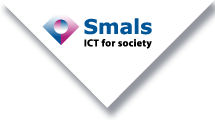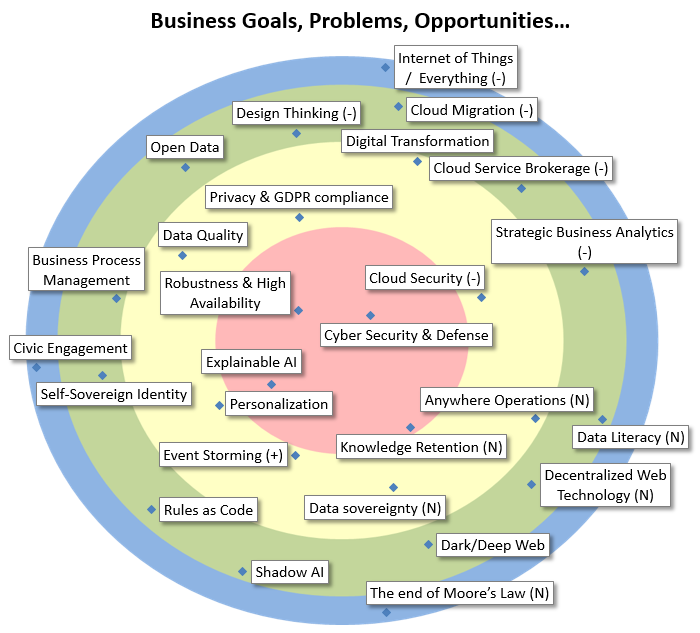Business Goals, Problems, Opportunities…
| Cyber Security & Defense | Cyber security is composed of technologies, processes and practices designed to protect networks, computers, programs and data from attack, damage or unauthorized access. Due to the rise of cyber warfare, defense against powerful attackers gains importance. |
| Robustness & High Availability | High availability is a characteristic of a system, which aims to ensure an agreed level of operational performance, usually uptime, for a higher than normal period. Modernization has resulted in an increased reliance on these systems. |
| Explainable AI | Public sector’s business needs require any deployed AI system to be robust and explainable. To this end we investigate existing and upcoming tools that increase transparency of AI systems towards the end user. |
| Knowledge Retention | When an employee leaves an organization, so does a part of an organization’s intellectual capital. Knowledge retention is a specific process within wider knowledge management activities concerned with persevering that intellectual capital. |
| Cloud Security | Sub-domain of Cloud Computing, encompassing all aspects related to the security of and cryptography in the cloud, whether private, public or hybrid. |
| Digital Transformation | “The creation of new business designs by blurring the boundaries between the digital and physical worlds due to the convergence of people, business and things” (Gartner). New technologies like IoT, analytics, machine learning, … are used to realize the digital transformation. |
| Privacy & GDPR compliance | Due to technological evolutions, protection of personal data is moving target that should continuously have our attention. Since may 2018, the GDPR is in force, which provides the legal framework, including obligations and potentially fines for enterprises. |
| Data Quality | Tools, methods and architectures to evaluate, improve and monitor data quality and to manage information, taking into account cost-benefit ratio and fitness for use (Includes Master Data Management). |
| Personalization | The goal of personalization is to accomplish a relevant and individualized interaction between an organization and her target audience in order to improve the user experience. |
| Event Storming | Proliferation of APIs and integrations necessitates better coordination between products/teams. Event storming, in which a business process is “stormed out” as a series of domain events, can rapidly identify key concepts in a problem space and align a variety of stakeholders. |
| Data sovereignty | Data sovereignty is the idea that data are subject to the laws and governance structures within the nation it is collected. The concept of data sovereignty is closely linked with data security, cloud computing and technological sovereignty. |
| Anywhere Operations | A combination of technologies enabling creation of a complete “digital, seamless and remote experience” from everywhere and for everyone (citizens, employees, business partners). Even at physical locations, digital enhancements can be made to be able to process everything seamlessly. |
| Strategic Business Analytics | Driven by corporate strategy, make use of state-of-the-art Analytics (techniques and platforms) to drive processes and support (informed, measured, evaluated) policy-making in strategic domains. Transcends what is possible with classical Statistics or BI. Increasingly makes use of AI. |
| Cloud Service Brokerage | Providing support with added value, such as security and integration, to help customers of Smals use cloud services efficiently and correctly. |
| Cloud Migration | As the pressure to move solutions to the Public Cloud increases, so does the inherent danger of vendor lock-in. Therefore, Cloud Migration strategies and techniques become a more important defensive measure to safeguard an enterprise’s flexibility in choosing Cloud Service Providers. |
| Design Thinking | Used to improve the design from software to products and services. Empathy for users and the gathering of insight into their needs and motivations is crucial. Used for digital innovation with focus on people. Closely related to Human-Centered Design and the uptake of (government) applications. |
| Open Data | Data interoperability based on documented “open data” for citizens, enterprises, … (and in some cases based on web semantics norms). One of the most important forms of open data is open government data. Mostly there are severe data quality issues. |
| Business Process Management | With more and more services and processes being automated and integrated, management and optimization of it all becomes paramount. BPM is evolving from simple control towards a suite of tools combining traditional automation with management, but also integrating AI. |
| Self-Sovereign Identity | Self-sovereign identity (SSI) is the idea the citizen have control over their personal data. They decide what they disclose to whom, have an overview of who can see what and can revoke access. Also, data personal data can be exported from and to services, such a social media. |
| Rules as Code | Concept from LegalTech, aiming to make policies both human-readable and machine-readable at the same time, in order to facilitate their implementation (OECD OPSI theme for 2020) |
| Shadow AI | Is the phenomenon where individuals (e.g. ‘citizen data scientists’) use easy-to-use tools to develop their own AI-solutions and models. Very powerful for the business, but also dangerous for an untrained audience and in the context of ethical decisions and biased data. |
| Dark/Deep Web | The deep web is the part of the Web not indexed by web search engines. The dark web is the part of the deep web that require specific software, configurations, or authorization to access. The dark/deep web is generally used for criminal activities. |
| Decentralized Web Technology | Set of web-based technologies to let people control their data and choose the applications and services to use with it, enabling a level-playing field for innovation and giving people a chance to regain control of their own data. |
| Data Literacy | Data literacy is the ability to collect, manage, manipulate, present, and understand data. Data literacy is crucial for knowledge workers, as it is essential for assessing and comprehending information presented and used in an organization. |
| Internet of Things / Everything | With the Internet of Things (IoT), many (electromechanical) objects, along with a vast amount of sensors and actuators, become connected to the internet and generate an abundance of data, allowing all kinds of new business. |
| Civic Engagement | The use of IT to stimulate voluntary participation and self-organization of citizens to create societal added value. The citizen can assume one or more roles, such as data provider. |
| The end of Moore’s Law | It’s becoming increasingly hard to maintain Moore’s law. Unless viable alternatives arise, the amount of available computer power will stagnate. This will have profound effects on innovation and economic growth. |

